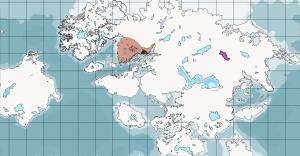Difference between revisions of "Pytharniaca"
Jump to navigation
Jump to search

Trismegistus (talk | contribs) m |
Trismegistus (talk | contribs) m |
||
| Line 2: | Line 2: | ||
An [[Asdarography|asdarographic]] term that refers to the entire subcontinent of [[Pytharnia]] and used to disambiguate from the term Pytharnia that can also mean several political and cultural entities. Pytharniaca is the preferred term in the study of [[magdeology]] for the whole subcontinent. | An [[Asdarography|asdarographic]] term that refers to the entire subcontinent of [[Pytharnia]] and used to disambiguate from the term Pytharnia that can also mean several political and cultural entities. Pytharniaca is the preferred term in the study of [[magdeology]] for the whole subcontinent. | ||
| + | |||
| + | [[File:MapLocator Pytharniaca.jpg|thumb|300px|Pytharniaca is a subcontinent of the northern hemisphere, colliding with the continent of [[Asdauria]] over a period of hundreds of thousands of years.]] | ||
Magdeologers believe the slow action of Pytharniaca is causing the uplift of the [[Jaggudorn Mountains]], transpiring over tens of thousands of years or even a million or more years. | Magdeologers believe the slow action of Pytharniaca is causing the uplift of the [[Jaggudorn Mountains]], transpiring over tens of thousands of years or even a million or more years. | ||
Revision as of 00:49, 1 March 2021
See also Pytharnia (disambiguation)
An asdarographic term that refers to the entire subcontinent of Pytharnia and used to disambiguate from the term Pytharnia that can also mean several political and cultural entities. Pytharniaca is the preferred term in the study of magdeology for the whole subcontinent.

Pytharniaca is a subcontinent of the northern hemisphere, colliding with the continent of Asdauria over a period of hundreds of thousands of years.
Magdeologers believe the slow action of Pytharniaca is causing the uplift of the Jaggudorn Mountains, transpiring over tens of thousands of years or even a million or more years.
See Also
| This article is a stub. It requires further development by the creator. |